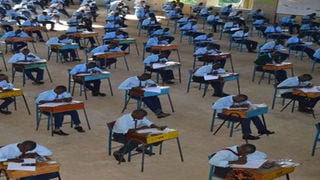Breaking News: At least 10 feared to have drowned in Makueni river

Students of St Peter's Mumias Boys High School, Kakamega, sit for their Kenya Certificate of Secondary Education Mathematics paper on November 7, 2016.
| FileEducation
Premium
KCPE, KCSE exam centre closures worries private schools
Learners from 162 schools whose examination centres were closed will sit their tests at neighbouring schools.
Knec chief executive David Njengere said the list of closed centres had not been released to the public but assured schools and parents the agency would ensure that examinations run smoothly.
“We have just concluded the registration of examination centres and further directions will be issued to the schools ahead of next year,” Dr Njengere said.
Some examination centres, he said, had been merged with others. The reduction affects 24 secondary and 138 primary schools that had less than 30 candidates each.
Standard Eight candidates will sit the exams for three days from March 7 to March 9, 2021, with rehearsals planned for March 6.
Form Four candidates will sit their written exams from February 28 to April 1, while practicals will start as early as January.
Speaking to the Nation, Kenya Private Schools Association executive officer Peter Ndoro said the decision to reduce examination centres will hurt some learners as they will be required to walk long distances to host schools.
He said private schools had asked lawmakers to allocate more money to the Kenya National Examination Council (Knec) so that closed centres can reopen.
“When we sat with Knec officials after they announced the new requirements for a school to be registered as an examination centre - that it should have at least 40 candidates - they said the decision was because of financial constraints,” he said.
“Therefore, as private schools we decided to make a request before Parliament seeking more money Knec so that learners will not have to travel long distances to sit for national exams.”
Mr Ndoro said the merging of centres needs to be re-examined to ensure that children sit their exams in their respective schools.
“Even if this issue is not resolved for this year’s examination, our MPs should consider going through our request and allocate more funds to Knec for the sake of the Kenyan children,” he said.
Kenya Primary Schools Heads Association (Kepsha) Chairman Johnstone Nzioka said the group had not received any complaints from public primary school heads over the merging of examination centres.
“It seems public primary schools were not affected, because I have not heard any complaints from school heads so far. I am hoping all schools are okay and have registered their candidates,” he said.
Knec had directed headteachers and principals from the affected schools to work with sub-county and county directors of education to determine the host schools.
Parents, especially those from private schools, have complained that if their children sit their exams at host schools, that could affect their performance.
A petition from a parent challenging Knec’s decision to reduce the number of candidates a centre should have is still pending in court.
Public secondary schools have not been greatly affected, as a majority have overcrowded classes due to the policy of 100 percent transition from primary to secondary.
In the last Form One placements, nearly all secondary schools received almost double their capacity.





